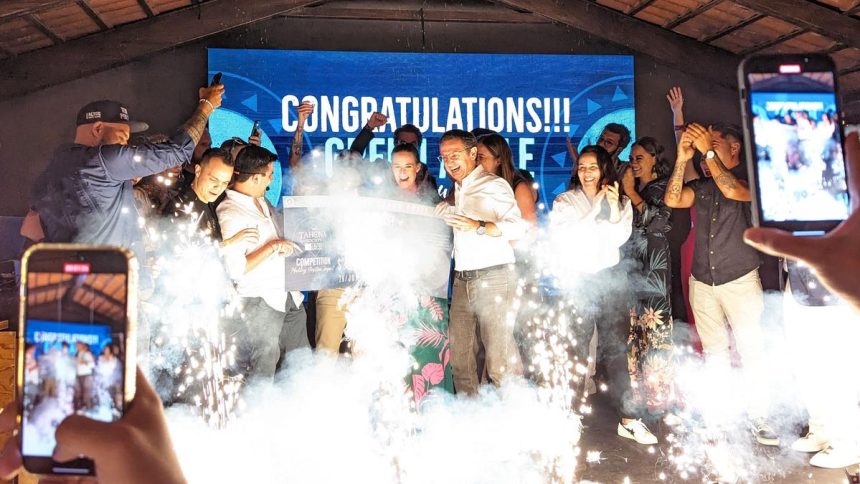There is no shortage of awards in the drinks business. One of the least known is probably among the best in terms of driving forward the sustainability and environmental message. This year’s winner of the Tahona Society’s competition was a perfect example.
Jenny Teasdale and Jeffrey Garcia took home the top prize of $50,000 to put towards their project: Green Apple: Zero Glass Waste. It aims to change the perception of glass waste, create jobs in the local community, and encourage bars and other retailers to recycle in the party hot spot of Cartagena, Colombia, a coastal city where municipal glass recycling has been near impossible.
Teasdale and Garcia plan to use the $50,000 prize to build a new recycling center in the city to make glass recycling more widely available than ever before as their contribution towards a more sustainable future for the local community, with or without the help of the local municipality.
Teasdale, an expat Brit, described the win as “life-changing – not just for us, but for our local community.” She added: “Glass waste in Cartagena has long been problematic. Our project aims to recycle up to 25% of the glass waste generated by tourism in the city within two years.” This is an example of private enterprise taking environmental responsibility when the public sector fails or can’t cope.
Sustainability From The Grass Roots Up
The third year of the awards this summer—supported by Altos Tequila, part of drinks giant Pernod Ricard’s Mexico-based House of Tequila—is a blueprint for authentic, believable, “from the grass roots up” sustainability programs of the future—with a healthy dose of ESG (environmental, social, and governance) thrown in.
Almost a week ago, I was on the judging panel for the first ESG awards run by the international drinks trade magazine Global Drinks Intel. I was struck by the strength of the entries, particularly from smaller supply-side players, where commitment to the environment often runs deeper. I also thought how the Tahona Society and its decision to do something about industry sustainability would fit right in, had there been a relevant category for it.
There was no obvious green-washing in sight during the event in Guadalajara. The competition’s 12 finalists from around the world all work behind the bar in a variety of capacities and it was their ideas alone that took them to Mexico pitch directly to the judges. They are the link between the consumers they serve, and the retail businesses they run or are employed by.
Their projects ranged from the simple reuse of waste food, in-bar grow-your-own herbs, and re-purposing waste glass as sellable art, to mental health support in an industry where alcohol and drug abuse often go unreported and unnoticed, as well as more financially ambitious efforts such as a community solar panel business for beach bars, and larger-scale solar farm projects.
The heavyweight judges had diverse backgrounds and included Kirén Miret, executive producer of the Mexico and Colombia editions of the Shark Tank reality television series; Dré Masso, co-founder of Altos Tequila, a long-time believer in making sustainable tequila; Luis Antonio Espino, a presidential speechwriter and strategic communications consultant; Elliot Kotek, CEO and founder of The Nation of Artists; and Michael Merolli, CEO of House of Tequila.
Green/Social Businesses That Can Scale Up
Finalists were heavily mentored and coached for three months leading up to the competition’s climax when yet more coaching was on hand; from one-to-one training to hands-on workshops from business and marketing experts. These methods have evolved over the years, designed to ensure that finalists have the skills needed to start their own businesses with their ideas, should they wish to.
Altos Tequila’s Masso, also a co-founder of The Tahona Society, told me: “This competition has evolved from a cocktail competition. I want these bartenders to develop something that goes beyond a non-profit scenario. I’d like to see long-term scale-up scenarios for these finalists and winners, where they can create an additional business from their projects. The business side of it is really important in this competition.”
Last year’s winners were Cubans who saw the value in collecting locally growing fruits and herbs—many often going to waste rotting on the roadside—and turning them into syrups and fresh ingredients for cocktails. As well as using the products in their own bar they have sold them to other hospitality businesses. “They now run a small factory and bottling facility helped by the grant they got from this competition,” said Masso.
He added in a statement: “The Tahona Society competition is growing year-over-year, as sustainability is a key issue that transcends the bartending community. We’re continually inspired by the caliber and variety of projects created by our bartenders. Green Apple: Zero Glass Waste is a prime example of an initiative that embodies Altos Tequila’s own core values of recycling and waste reduction.”
Read the full article here







